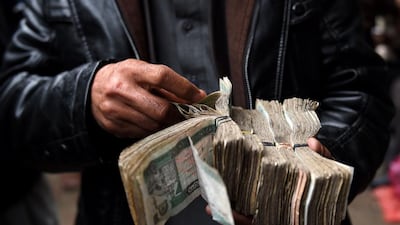KABUL // The bruises, scabs and chain markings have long faded, but Haji Ghulam is still visibly traumatised by his month-long abduction, one of dozens of victims of a violent crime surge plaguing the Afghan capital.
While the relatively rare kidnappings of foreigners grab international headlines, this wave of abductions of Afghans such as Mr Ghulam has put the city on edge.
Afghan police, already stretched on many insurgent battlefronts, are struggling to cope with kidnapping rings that target not just the wealthy, but anyone that appears to have money.
Mr Ghulam, a 53-year-old professional money-changer, was waylaid by two carloads of armed men in military uniform as he was driving home from work with his son and cousin in spring last year.
“I thought they were policemen, but they beat my son and cousin and dragged me to their vehicle. I was blindfolded, slapped, beaten. They drove for an hour and dropped me in a hole in the ground,” he said.
His kidnappers tortured him and sent recordings of his screams to his family, demanding a ransom of $2 million, a huge sum in one of the world’s poorest countries. He was fed little more than a piece of bread every day.
A month later, security officials discovered Mr Ghulam in that hole in a small house on the outskirts of Kabul, maimed, emaciated and chained. His kidnappers are still at large.
Mr Ghulam still walks with a limp and has developed twitches and a stammer. He now uses an armoured vehicle and private guards for his protection. But he is one of the lucky ones.
One 14-year-old Afghan boy was abducted and murdered, his body dumped in Kabul. In another incident, a city shopkeeper’s ear was sliced off by his kidnapper and sent to his family to press them to pay up.
Recently, a Kabul businessman sold off all his entire to pay ransom for his kidnapped son, but he remains in captivity.
Reliable official statistics are hard to obtain, but Afghanistan’s Chamber of Commerce and Industries said about 80 businessmen were kidnapped around the country last year. Experts believed many other cases went unreported for fear of reprisals from the kidnappers.
Kidnappings and extortion have become a cottage industry. Car thefts are common. Kabul is a city so riddled with crime that displaying wealth can be tantamount to a death sentence. Rampant poverty and rising unemployment only worsen the situation, the underresourced fledgling police force are battling the Taliban, ISIL and other militant groups and the kidnapping rings appear to be feeding off the growing insecurity.
Nearly 100 money-changers were kidnapped last year, said Haji Zeerak, a spokesman for money changers in Kabul’s Shahzada market. “In addition to the threat of bombings, the city is plagued by kidnappers and extortionists. Because of this, business is down and more people are fleeing the country.”
Armed men recently stole $1.2m from a Kabul money changer after stopping his car. When the money changers protested to president Ashraf Ghani, police arrested a criminal gang said to be behind it but the money has not been recovered, Mr Zeerak said.
Criminal gangs often sell abductees, especially foreigners, to insurgent groups for a higher price, who transfer them to the badlands across the border in Pakistan, officials said.
But the police force insisted a crackdown has begun, citing the 3,000 criminals — including 16 prolific kidnappers — apprehended in the past year.
“There has been a substantial increase in crime, but we are making progress in fighting it,” said outgoing Kabul police chief Abdul Rahman Rahimi. “We will chase every kidnapper.”
Rising crime is thwarting efforts to wean the Aghan government off its dependence on foreign aid nd also forcing much needed investors to flee.
“Investment in Afghanistan is falling due to insecurity and kidnappings,” Siamuden Pasarly, spokesman for Afghanistan’s Chamber of Commerce and Industries, said.
The government’s inability to curb kidnappings has led many like Mr Ghulam to suspect that some criminals are in cahoots with security officials.
“If the Afghan government cannot stop insurgent attacks, can they at least focus on fighting crime?” he said.
* Agence France-Presse

